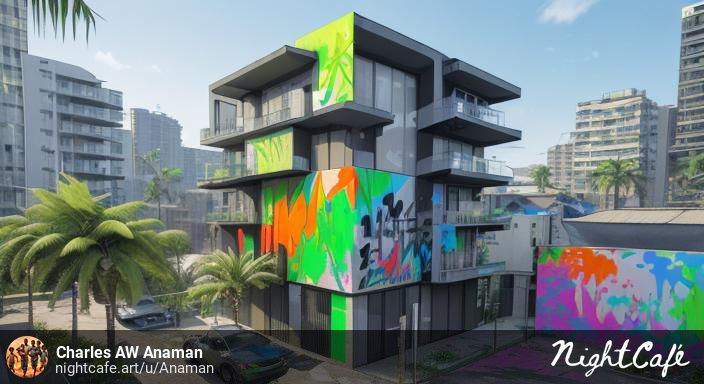Written with AI
In the quest for sustainable development and global stability, third-world nations, particularly in Africa, are at a pivotal crossroads. Historically subjected to exploitation and unequal trade practices, these nations are now poised to redefine their futures by embracing cutting-edge technologies like Artificial Intelligence (AI) and blockchain. By integrating these technologies, they can enhance infrastructure, manage resources efficiently, and foster transparent governance, ultimately respecting their sovereignty and contributing to a more balanced global landscape.
AI and Blockchain: The Dual Engines of Transformation
AI and blockchain are not just buzzwords; they are powerful tools that, when combined, can drive significant advancements in governance, economic management, and societal well-being. Here’s how third-world nations can harness these technologies to foster equitable and fair development:
- Optimizing Infrastructure and Resource Management with AI
Smart Urban Planning and Predictive Maintenance
AI-driven urban planning can revolutionize how cities grow. By analyzing data on population trends, traffic patterns, and environmental conditions, AI helps design smart cities that are efficient, sustainable, and cost-effective. Predictive maintenance powered by AI ensures that critical infrastructure like roads, bridges, and power grids are maintained proactively, reducing downtime and extending their lifespan.
Precision Agriculture and Resource Optimization
In agriculture, AI enables precision farming techniques that optimize crop yields and minimize waste. By leveraging data from sensors and satellite imagery, AI can provide actionable insights for farmers, enhancing food security and creating surplus for export. Similarly, in mining and natural resource management, AI ensures that extraction processes are efficient and equitable, preventing exploitation and ensuring fair value for the nation’s resources.
- Enhancing Transparency and Fairness with Blockchain
Transparent Supply Chains and Real-Time Stock Management
Blockchain technology ensures that every step of the supply chain is transparent and immutable. From the extraction of minerals to the sale of agricultural produce, blockchain tracks resources meticulously, minimizing fraud and inefficiencies. Real-time stock management becomes feasible, allowing nations to monitor production levels and distribution networks effectively, thereby reducing waste and ensuring equitable resource distribution.
Decentralized Consensus Voting for Governance
Blockchain-based voting systems empower communities to participate directly in decision-making processes. Whether it’s allocating resources, approving infrastructure projects, or setting environmental policies, decentralized voting ensures that decisions reflect the collective will, fostering fairness and reducing corruption. Smart contracts further automate governance, ensuring that funds and resources are allocated transparently and efficiently based on consensus-driven decisions.
- Strengthening Negotiation Power and Economic Independence
Data-Driven Negotiations and Alternative Financing
AI equips nations with the ability to analyze global trade data, historical trends, and economic forecasts, empowering them to negotiate trade agreements and contracts that are more favorable. This reduces dependence on exploitative institutions like the IMF, WTO, and World Bank. Additionally, blockchain facilitates the creation of digital tokens and alternative financing models, such as sovereign wealth funds and BRICS bank initiatives, providing new avenues for economic growth and reducing reliance on traditional loans.
Fair Trade and Equitable Resource Exchange
Blockchain ensures that trade agreements are honored and fair pricing mechanisms are maintained. Digital tokens representing stocks of resources or commodities enable transparent and equitable exchanges, protecting producers from exploitation and ensuring that nations receive fair value for their resources.
- Combating Corruption and Enhancing Governance
Transparent Public Procurement and Anti-Corruption Measures
Blockchain’s immutable ledger ensures that every transaction, contract, and resource allocation decision is publicly verifiable. This transparency makes it difficult for corrupt practices to thrive, as all actions are recorded and accessible for audit. Public procurement processes managed via blockchain are fairer and more transparent, ensuring that contracts are awarded based on merit and not favoritism.
AI-Driven Public Services
AI can automate and digitize public services, reducing bureaucratic inefficiencies and minimizing opportunities for corruption. From healthcare to education, AI ensures that services are delivered efficiently and equitably, enhancing the quality of life for citizens and building trust in public institutions.
- Fostering Digital Transformation and Economic Diversification
Developing Technology Hubs and the Digital Economy
Investing in technology hubs and the digital economy creates new industries and reduces reliance on traditional exports. AI and blockchain can drive innovation, attracting investment and fostering a vibrant entrepreneurial ecosystem. This diversification is crucial for economic resilience and long-term sustainability.
Education and Skills Development
AI-powered personalized learning platforms can revolutionize education, equipping the workforce with the skills needed in AI, technology, and modern industries. A skilled workforce is essential for leveraging AI and blockchain effectively, ensuring that nations can sustain their technological advancements and economic growth.
- Promoting Geopolitical Realignment and Sovereignty
Strengthening BRICS Collaboration
By joining the BRICS group, third-world nations can collaborate on technological advancements and economic initiatives that promote a multipolar world order. AI and blockchain can facilitate cooperation within BRICS, enabling these nations to pool resources, share knowledge, and negotiate collectively for better terms on the global stage.
Adopting Digital Currencies and Payment Systems
Embracing digital currencies and alternative payment systems reduces dependence on Western financial institutions. Blockchain-based digital currencies offer greater control over economic policies and transactions, enhancing financial sovereignty and reducing vulnerability to external economic pressures.
- Ensuring Environmental Sustainability
AI in Climate and Disaster Management
AI can predict natural disasters, manage environmental risks, and optimize resource usage to mitigate the impact of climate change. These capabilities not only protect communities but also position nations as leaders in global sustainability efforts, attracting international support and funding.
Blockchain for Sustainable Practices
Blockchain ensures that environmental initiatives are transparent and accountable. From tracking carbon credits to managing sustainable resource usage, blockchain provides the necessary transparency to ensure that environmental goals are met effectively and fairly.
Conclusion: A Path Towards Equitable and Stable Global Future
By strategically integrating AI and blockchain technologies, third-world nations can transform their infrastructure, governance, and economic models. These technologies empower nations to manage resources transparently, reduce corruption, and negotiate from a position of strength. As these nations join the BRICS group and prioritize their sovereignty, they contribute to a more stable and equitable global order. Embracing AI and blockchain is not just about technological advancement; it’s about respecting and empowering sovereign peoples, ensuring that development is fair, inclusive, and sustainable for generations to come.
Empowering Sovereignty, Ensuring Stability
The journey towards leveraging AI and blockchain is a testament to the resilience and ingenuity of third-world nations. By embracing these technologies, they honor their sovereignty, uplift their people, and contribute to a more balanced and stable world. In doing so, they not only rewrite their own destinies but also pave the way for a global future that respects and uplifts all sovereign nations.

